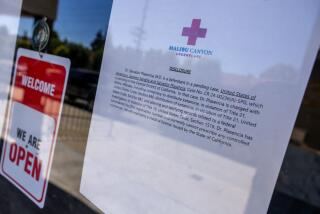Redlands Doctor Won’t Lose License
- Share via
A Redlands physician in danger of losing his license over allegations that he administered a lethal dose of morphine to hasten the death of a dying patient was cleared of the charge and can continue practicing medicine, the state medical board decided this month.
Dr. Harold Luke was issued a reprimand for inadequate record-keeping when he increased the morphine dosage of his ailing 76-year-old patient, identified only as Morris E., in September 2002 without clearly recording changes in the man’s condition.
The board determined that Luke was not negligent but that he should have raised the dose more gradually. The state board ordered Luke to take a medical record-keeping course.
“It’s a great relief,” Luke said of the board’s decision. “It’s like someone who was on the death penalty” being given a last-minute reprieve.
“The board did the right thing,” said the 59-year-old physician. “I have done nothing wrong.”
State medical regulators initially questioned Luke’s judgment in raising his elderly patient’s morphine levels tenfold to treat pain caused by severe loss of muscular function, inability to swallow, kidney failure and emphysema, among other ailments, according to medical board documents.
The board’s Division of Medical Quality originally recommended revoking Luke’s license last fall but reviewed the case after Luke’s attorneys filed a petition for reconsideration.
Luke said he had enrolled in the medical records class.
In the meantime, he said, he has lost patients and staff privileges at local hospitals and his professional reputation has been damaged.
“It’s a nightmare,” he said. “I have tried to help the patient be more comfortable when he was in agony. He was in distress. He was having trouble breathing.”
Morris E.’s family supported Luke’s treatment of him and submitted a letter to the state board on the doctor’s behalf.
Pain relief for dying patients is challenging because morphine relieves pain but in large doses can shorten life, according to experts who testified in the case.
Several pain management advocates united behind Luke, fearful that revocation of his license could have hampered doctors’ ability to care for terminally ill patients in pain.
Such “Draconian” sanctions against Luke would have sent “a message to all doctors that care for dying patients ... is risky and could potentially exacerbate the problem of under-treatment of pain,” said Kathryn Tucker, director of legal affairs for Compassion & Choices, a patient advocacy group that filed legal briefs on Luke’s behalf.
In California, physicians who prescribe opiates to relieve chronic suffering have some protections under the Intractable Pain Treatment Act. And the California Pain Patient’s Bill of Rights, passed in 1997, guarantees seriously ill patients access to pain relievers.
Luke told the board that, as a Seventh-day Adventist, he does not believe in euthanasia.
More to Read
Sign up for Essential California
The most important California stories and recommendations in your inbox every morning.
You may occasionally receive promotional content from the Los Angeles Times.












